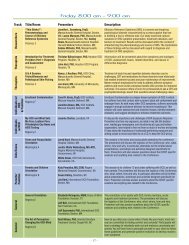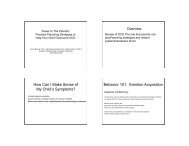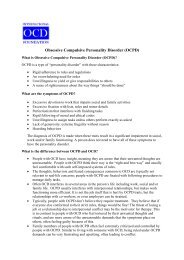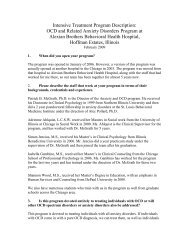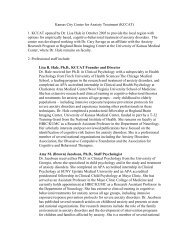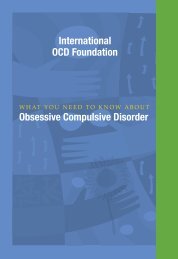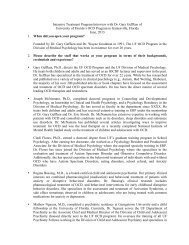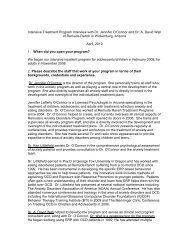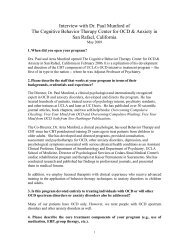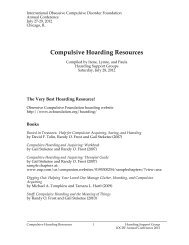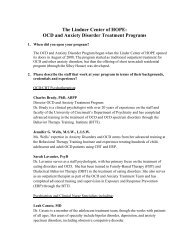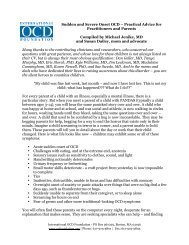Intensive Treatment Program Interview with Diane Davey, RN, MBA ...
Intensive Treatment Program Interview with Diane Davey, RN, MBA ...
Intensive Treatment Program Interview with Diane Davey, RN, MBA ...
- No tags were found...
Create successful ePaper yourself
Turn your PDF publications into a flip-book with our unique Google optimized e-Paper software.
(examples: interpersonal skills, problem solving skills, etc.). In addition to individualmeetings <strong>with</strong> the behavior therapist, the patient also engages in daily, two-hour ERPexercises <strong>with</strong> the direct care staff, both individually and in groups.b. Medication - Michael Jenike, MD, the program's Medical Director, oversees thetreatment of all patients. He and the other program psychiatrists meet <strong>with</strong> patientsweekly, and more frequently if required, to evaluate and update each patient’smedication plan.c. Group and Milieu Therapy - The milieu (the patient community) is designed to stressactive patient involvement in the treatment process—the patient is viewed as acollaborator in his or her own treatment, rather than simply a passive recipient. Eachpatient, based on feedback from staff and other patients, completes a weeklytherapeutic contract detailing his or her treatment plan for the upcoming week. At theend of the week, the patient receives feedback once again from staff and otherpatients on the progress and effort he has made. Patients complete regular objectivemeasures of improvement, and attend five to six therapy groups per day. Grouptherapy targets increasing motivation and compliance, decreasing behavioralsymptoms, increasing normalized family, work and social functioning, and providingeducation and support.d. Family Therapy and Case Management - Each patient is assigned to one of theprogram's social workers, who meets <strong>with</strong> the patient weekly to provide casemanagement, conduct family therapy as needed and works <strong>with</strong> the patient arounddischarge and aftercare planning.5. Please describe the treatment planning process at your program.<strong>Treatment</strong> planning begins immediately upon admission. On the patient’s first day ofadmission, the patient and his/her family meets <strong>with</strong> the social worker on the team. Educationfor family members is provided, as well as plans for how family members can best providesupport for the patient rather than accommodate the OCD symptoms. Patients then meet<strong>with</strong> their behavior therapists who assess their symptoms and begin drafting their exposurehierarchy for exposure and response prevention work. Behavior therapists prescribe topicspecific groups for the patient to attend along <strong>with</strong> general groups, which all patients areexpected to attend. Psychiatrists meet <strong>with</strong> patients weekly to discuss plans for medication.<strong>Treatment</strong> targets will shift during the course of the treatment based on the phase oftreatment for that individual patient (i.e., pre-treatment, active treatment, generalization ofgains, relapse prevention). All members of the treatment team exchange information duringand in-between clinical rounds to make sure everyone is on board <strong>with</strong> the treatment plan,including the patient, throughout the course of the treatment. Patients also fill out acomprehensive set of questionnaires prior to admission, at admission, each month while inthe program and at discharge. Information from these questionnaires is factored into eachpatient’s treatment plan.6. If someone has a co-morbid condition, can he or she participate in your program?Will there be treatment for the co-morbid condition? If so, can you give anexample?
Typically, co-occuring anxiety disorders are treated <strong>with</strong>in the context of the OCD Institute.Other co-morbid conditions are assessed on a case-by-case basis. For example, if someonehas an active substance dependency problem (still using substances while trying to beadmitted to the Institute) or an active eating disorder (examples: currently bingeing, purgingor restricting), he/she may not admitted to our program. That is, the co-occurring conditioncannot interfere <strong>with</strong> their OCD treatment or be more prominent than their OCD symptoms.Due to the stress-inducing nature of ERP, any current co-morbid conditions that are notunder reasonable control prior to admission to the Institute might result in an exacerbation ofthose conditions. Due to this, we ask that patients be free of alcohol and other substance use,free from self-harming behaviors such as cutting and burning, etc. for a period of time priorto admission.7. Are parents, family members, friends, teachers, etc. included in the treatment? Ifyes, please describe how.Yes. Parents, spouses, family members, and significant individuals in the lives of ourpatients are included in the treatments. With the collaboration of our patients, our socialworkers invite these individuals to take part in weekly family meetings and/or conferencecalls. The purpose of doing this is to focus on identifying any family accommodation issuesthat may exist and to talk about family functioning in general and how it has been affected orchanged as a result of the patient’s OCD symptoms. Our social workers provide patients andfamilies members <strong>with</strong> insights and strategies that will help the family system, and morespecifically will allow family members to effectively help the patient both while the patient isin treatment as well as when the patient returns home.8. How often do patients in the program meet <strong>with</strong> staff individually? How long arethese individual sessions?On average, patients meet <strong>with</strong> their behavior therapist 2-3 times a week, their social worker1-2 times a week (this includes a family meeting), and their psychiatrist 1-2 times a week.Sessions <strong>with</strong> behavior therapists are 50-minutes each but can be longer if the sessionsinvolve exposure work, particularly those that are out in the community. Sessions <strong>with</strong> socialworkers are typically 50-mintues each on average. Sessions <strong>with</strong> psychiatrists can range from15 to 45 minutes depending on phase of treatment. For example, if the session is forassessment purposes upon admission or for medication management purposes throughout thecourse of the patient’s stay. Each patient work <strong>with</strong> our team of community residentcounselors daily and are assigned to a contact counselor each shift <strong>with</strong> whom they check in<strong>with</strong> individually. There are no set session times for patient’s work <strong>with</strong> the counselors astheir interactions are in the milieu and are throughout the day.9. Is there a set time period for a patient’s treatment in the program? What is theoverall time commitment to the program (for example, attend daily for threeweeks)? How much flexibility is there in extending someone’s stay if needed?There is an initial two-week assessment period in our program. Once a patient is admitted tothe program, it is expected that they will attend the program daily Monday-Sunday if they are
a resident and Monday-Friday if they are a partial hospital patient. The average length of stayis 1-3 months. Flexibility in extending someone’s stay vary on a case-by-case basis.10. Is there a homework or “self directed” component to the treatment?Yes. Each day of the week (Mon-Sun) there is a set 2-hour block of time in the programscheduled for self-directed exposure and response prevention work. Homework assignmentsare given during many of our topic specific groups (e.g., emotion regulation, motivation,cognitive therapy). Furthermore, patients participate in a daily “<strong>Treatment</strong> Planning” groupwhere they are expected to set goal(s) for the day. At the end of each day, they meet as agroup in “Self-Assessment” to discuss about the progress toward that goal and if that goalwas achieved. We strongly believe in helping our patients become active participants in theirtreatment and to be accountable for their recovery process on a daily basis. Homework andself-directed components of our treatment speak to this value in our program.11. Please describe the relapse prevention strategies you use in your program.We have various relapse prevention strategies in our program including our RelapsePrevention group which is mandatory for all patients in the program. We also teach ourpatients how to set goals on a daily basis and how to track their progress on a daily andweekly basis. We set time for daily self-directed exposure and response prevention time aswe know the correlation between daily self-directed exposures and relapse prevention.Furthermore, we talk to family members about ways in which they can help play a helpingrole in the prevention of relapse. Additionally, discharge planning focuses primarily on thecontinuation of treatment as well as daily structure, the 2 items in our own research that bestpredicted better outcomes after discharge from our program.12. What kind of follow-up do you do for those who complete your program? Will themembers or your treatment team be in contact <strong>with</strong> or willing to consult <strong>with</strong> theindividual’s regular treatment provider(s)?Members of our treatment team are often in contact <strong>with</strong> outpatient provider(s) prior to,during and after admission. Continuity of care is important to us so we always makeourselves available to our patients and their treatment providers. At times, patients havereturned to our program to speak to current residents about their recovery process as way tomotivate other people who also suffer from OCD.13. Do you offer a sliding fee scale or scholarships for those who cannot afford yourprogram?There are no scholarships for our program at this time. For the most part, there are also onlylimited sliding fee scales for only certain portions of program fees. We do, however, accepta wide range of insurance, including Medicare and Massachusetts Medicaid.
14. Does your program only work <strong>with</strong> individuals who are local or are therearrangements for those who come from farther away (for example, lodgingarrangements)?Our program does not limit our services to individuals who are local. We admit patients fromall over the world, and the majority of our patients reside in our 20-bed residential program.We also have availability for three patients, who typically live local, to attend the program asPartial Hospital patients from 9am-5pm, Monday through Friday. At intake, some non-localpatients have negotiated placement in the Partial Hospital program and arranged their ownlodging accommodations.15. Please add any information you think would be helpful in describing the uniqueaspects of your program if this has not been covered in the questions above.The OCD Institute is one of only three residential facilities for OCD in the country. With itsbroad scope of available treatments, wide array of professional and experienced staff, andaccess to Harvard-affiliated hospitals and services, it is truly a one-of-a-kind program.




